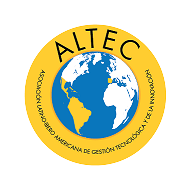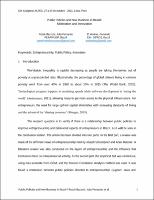| dc.contributor.author | Rossi Mazzoni, João Fernando | |
| dc.contributor.author | D´Andrea, Fernando | |
| dc.date.accessioned | 2022-09-30T21:26:09Z | |
| dc.date.available | 2022-09-30T21:26:09Z | |
| dc.date.issued | 2021 | |
| dc.identifier.uri | https://hdl.handle.net/20.500.13048/1913 | |
| dc.description.abstract | Worldwide, inequality is rapidly decreasing as people are taking themselves out of poverty at unprecedented rates. Illustratively, the percentage of global citizens living in extreme poverty went from over 40% in 1980 to about 10% in 2015 (The World Bank, 2020). Technological progress happens at escalating speeds while software development is ‘eating the world’ (Andreessen, 2011), allowing many to get more access to the physical infrastructure. For entrepreneurs, the need for large upfront capital diminishes with increasing standards of living and the advent of the ‘sharing economy’ (Munger, 2018). The research question is to verify if there is a relationship between public policies to improve entrepreneurship and behavioral aspects of entrepreneurs in Brazil, as it will be seen in the conclusion section. The article has been divided into two parts. In the first part, a review was made of the different views of entrepreneurship held by Joseph Schumpeter and Israel Kirzner. A literature review was also conducted on the layers of entrepreneurship and the influence that institutions have on entrepreneurial activity. In the second part, the empirical test was carried out, using data available from GEM, and the Pearson Correlation Analysis method was used. It was found a correlation between public policies directed to entrepreneurship (support, taxes and bureaucracy, stimulus programs) with entrepreneurial activity, the motivation to undertake and the rate of innovation of new enterprises. This result can be useful for theoretical and practical reasons, which means that it opens up possibilities for more research analysis about entrepreneurship and institutional variables and allows entrepreneurs to understand and handle challenges that affect their everyday situations. | |
| dc.language.iso | spa | |
| dc.rights | Atribución-NoComercial-SinDerivadas 2.5 Perú | * |
| dc.rights | info:eu-repo/semantics/openAccess | es_ES |
| dc.rights.uri | http://creativecommons.org/licenses/by-nc-nd/2.5/pe/ | |
| dc.subject | Entrepreneurship | |
| dc.subject | Public Policy | |
| dc.subject | Innovation | |
| dc.title | Public Policies and New Business in Brazil: Motivation and Innovation | |
| dc.type | info:eu-repo/semantics/conferenceObject | |
| dc.relation.conferencedate | 27 - 29 de octubre, 2021 | |
| dc.relation.conferencename | XIX Congreso Latino-Iberoamericano de Gestión Tecnológica | |
| dc.relation.conferenceplace | Lima, Perú | |
| dc.contributor.corporatename | Pontificia Universidad Católica del Perú | |


